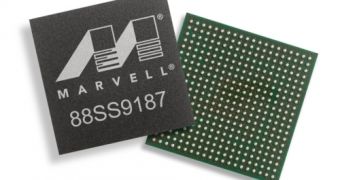Marvell has announced the completion of the 88SS9187 third-generation solid state drive controller chip, one that enables better performance at lower cost and energy use.
The new processor is compliant with the SATA Revision 3.1 specification and supports on-chip RAID technology for NAND devices.
It also handles high-speed DDR3 DRAM interfaces and capacities of up to 1 GB, for capable mapping algorithms.
Furthermore, when actually used in a SATA 6.0 Gbps SSD, it can transfer data at up to roughly 500 MB/s.
“We continue to drive market-leading innovation in our SATA technology products, as seen with today’s launch of the 88SS9187 SATA controller powered by high performance embedded processor technology,” said Alan Armstrong, vice president of Marketing for the Storage Business Group at Marvell Semiconductor, Inc.
“The best-in-class, open architecture of the device allows SSD manufacturers to fully customize their products to meet specific customer demands and distinguish their products based on price, performance, power and functionality. Marvell is thrilled to be leading the industry with our advanced SSD acceleration technology, which is enabling our partners to take their products to the next level.”
The newcomer supports up to eight NAND channels, with four CEs per channel and auxiliary data insertion, extraction and comparison.
An advanced ECC scheme is present as well, along with support for offloading firmware from low-level NAND handling.
It should be possible to create SSDs that are not only efficient, but also cheap enough to be utilized in mainstream applications, rather than only high-end ones. Affordable ultrabooks may no longer be a dream, for instance.
Unfortunately, there is no telling when actual products will appear, and it may be tricky to compete with the chip collection from SandForce, whose data rates are still better.
Then again, SF processors rarely, if ever, get used for anything below the top tier of the SSD segment, so that may not be as large an issue as some may expect.

 14 DAY TRIAL //
14 DAY TRIAL //